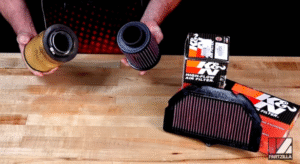
A deep cycle marine battery is a special type of battery designed for boats and other marine equipment. Unlike regular batteries, a deep cycle marine battery is made to handle long periods of use and repeated charging. This means it can go through many charging and discharging cycles without losing its power too quickly.
When choosing a deep cycle marine battery, it’s important to know how it works and what it’s best for. This type of battery is ideal for running equipment on your boat, like lights, radios, and other electronics. Understanding what a deep cycle marine battery does can help you make the best choice for your needs.
What Is a Deep Cycle Marine Battery
A deep cycle marine battery is a type of battery made especially for boats. Unlike car batteries, which are designed to start engines, deep cycle marine batteries give a steady amount of power over a long period. This means they’re perfect for running lights, radios, and other equipment on your boat.
This kind of battery works by slowly releasing power instead of all at once. It can handle being used and recharged many times, which makes it very durable. This feature is why it’s so popular for marine use, where you need reliable energy for long periods.
In simple terms, a deep cycle marine battery is like a hardworking helper. It keeps all your boat’s electronics running smoothly, even after many uses and recharges.
How Deep Cycle Marine Batteries Differ from Regular Batteries
Deep cycle marine batteries are quite different from regular car batteries. Car batteries are designed to give a big burst of power to start the engine, but they don’t last long if used continuously. They are not meant for running things for a long time.
On the other hand, deep cycle marine batteries are built to provide a steady flow of power over time. They can be drained and recharged many times without losing their ability to hold a charge. This makes them much better suited for powering boats and other marine equipment.
To sum up, deep cycle marine batteries are better for long-term use on boats. They are designed to handle frequent use and recharging, unlike regular batteries that are better for short bursts of power.
Why a Deep Cycle Marine Battery Is Essential for Your Boat
A deep cycle marine battery is essential for your boat because it ensures you have enough power for everything you need. Whether you’re using lights, a radio, or other electronics, this battery provides a steady and reliable source of power.
Without a deep cycle marine battery, you might run out of power during your trip. Regular batteries might not handle the constant use and recharging needed on a boat. The deep cycle version is specifically designed to meet these demands and keep everything running smoothly.
In short, a deep cycle marine battery is a key part of your boat’s setup. It’s designed to offer dependable power for all your boating needs, making it a must-have for every boat owner.
Top Benefits of Using a Deep Cycle Marine Battery
Using a deep cycle marine battery on your boat has several great benefits. First, it provides long-lasting power, so you don’t have to worry about running out of energy while you’re out on the water.
Another advantage is that it can be recharged many times without losing its performance. This means you won’t need to replace it as often, saving you money in the long run. Additionally, deep cycle marine batteries are built to withstand the tough conditions on a boat, making them a very durable choice.
Overall, a deep cycle marine battery is a smart investment for any boat owner. It keeps everything working well and lasts longer than regular batteries.
How to Choose the Best Deep Cycle Marine Battery for Your Needs
When choosing the best deep cycle marine battery, you need to consider a few important things. First, look at the battery’s capacity, which is measured in ampere-hours (Ah). This tells you how much power the battery can store and provide.
Next, check the battery’s cycle life. This is how many times it can be charged and discharged before it starts to lose its ability to hold a charge. A battery with a higher cycle life will last longer and be more reliable.
Finally, make sure the battery fits in your boat’s space and matches your power needs. By considering these factors, you can find the right deep cycle marine battery for your boat.
The Lifespan of a Deep Cycle Marine Battery Explained
The lifespan of a deep cycle marine battery is an important factor to understand. Typically, these batteries are designed to last several years if used and maintained properly.
The battery’s lifespan is influenced by how many charge and discharge cycles it can handle. A battery with a higher cycle life will last longer. Regular maintenance, such as keeping the battery clean and properly charged, also helps extend its life.
In general, if you take good care of your deep cycle marine battery, it should provide reliable service for many years. Knowing about its lifespan helps you get the most out of your battery investment.
Common Misconceptions About Deep Cycle Marine Batteries
There are a few common misconceptions about deep cycle marine batteries. One is that all batteries labeled as “deep cycle” are the same. In reality, some are better for marine use than others.
Another misconception is that deep cycle batteries are only useful for boats. Actually, they can be used in other applications like RVs or solar power systems where you need a lot of energy over time.
By understanding these misconceptions, you can make better decisions when selecting a battery for your needs. It’s important to know what you’re getting to ensure you choose the right one for your boat or other uses.
How to Maintain Your Deep Cycle Marine Battery for Longevity
Maintaining your deep cycle marine battery is key to making it last as long as possible. One important tip is to keep the battery clean and free from corrosion. Check the terminals regularly and clean them if necessary.
Another tip is to make sure the battery is properly charged. Avoid letting it run too low, as this can shorten its lifespan. Also, store the battery in a cool, dry place when it’s not in use to help preserve its life.
By following these maintenance tips, you can keep your battery in good condition and ensure it continues to provide reliable power for years to come.
Comparing Deep Cycle Marine Batteries: What to Look For
When comparing deep cycle marine batteries, there are a few key factors to consider. First, check the battery’s capacity, which is measured in ampere-hours (Ah). This tells you how much power the battery can store.
Another important factor is the battery’s cycle life. A battery with a higher cycle life will last longer and provide better value. Also, consider the battery’s size and whether it fits your boat’s space, as well as the reputation of the manufacturer.
By comparing these factors, you can choose the best deep cycle marine battery for your needs.
Affordable Deep Cycle Marine Batteries: What to Expect
If you’re looking for an affordable deep cycle marine battery, there are a few things to keep in mind. Lower-priced batteries can be a good value, but they may not always perform as well or last as long as more expensive options.
Expect to balance cost with important features like capacity and cycle life. A more affordable battery might have a lower capacity or shorter cycle life, so consider how much power you need and how often you’ll use the battery.
Understanding what to expect from affordable options will help you make a smart choice and find a deep cycle marine that fits your budget and requirements.
How to Install a Deep Cycle Marine Battery Correctly
Installing a deep cycle marine battery correctly is essential for its performance and safety. First, make sure the battery is securely placed in the battery compartment. It should be firmly anchored to prevent movement while the boat is in motion.
Next, connect the battery cables. Start by attaching the positive (red) cable to the positive terminal on the battery. Then, connect the negative (black) cable to the negative terminal. Ensure the connections are tight to avoid any electrical issues.
Always follow the manufacturer’s instructions for installation. Incorrect installation can lead to poor performance or even damage to the battery. By taking these steps, you’ll ensure your deep cycle marine works efficiently and safely.
Deep Cycle Marine Battery vs. AGM Battery: What’s the Difference?
When choosing a deep cycle marine battery, you might come across AGM (Absorbent Glass Mat) batteries. These are a type of deep cycle battery with some distinct features. AGM batteries are known for their ability to handle deep discharges and have a low self-discharge rate.
One key difference is that AGM batteries are usually sealed, making them spill-proof and safer to use. They also tend to have a longer lifespan compared to standard deep cycle marine batteries. However, AGM batteries can be more expensive.
Understanding these differences helps you choose the best battery for your needs, whether you prioritize cost, lifespan, or safety.
The Impact of Temperature on Deep Cycle Marine Batteries
Temperature can greatly affect the performance of a deep cycle marine. In cold weather, a battery may lose its ability to hold a charge and may not perform as well. In contrast, high temperatures can cause the battery to overheat, leading to potential damage.
To protect your battery, try to store it in a temperature-controlled environment when not in use. If this isn’t possible, using a battery cover can help shield it from extreme temperatures. Proper storage helps maintain the battery’s performance and extends its lifespan.
How to Test a Deep Cycle Marine Battery’s Performance
Testing your deep cycle marine battery’s performance is important to ensure it’s working properly. One simple way to test is by using a multimeter to check the battery’s voltage. A fully charged battery should read around 12.6 volts or higher.
Another method is to perform a load test, which measures how well the battery holds up under a load. This can be done with a battery load tester, available at most auto parts stores. If the battery fails these tests, it might be time for a replacement.
Regular testing helps you keep track of your battery’s health and ensures it’s ready for your next boating adventure.
The Cost of Deep Cycle Marine Batteries: What You Should Know
The cost of deep cycle marine batteries can vary widely depending on factors like brand, capacity, and type. Generally, higher-capacity and high-performance batteries tend to be more expensive. It’s important to find a balance between cost and quality.
When considering the cost, think about the battery’s lifespan and performance. A higher initial investment might save you money in the long run if the battery lasts longer and performs better. Always compare different options and choose one that fits your budget and needs.
Understanding the cost factors helps you make an informed decision and find the best value for your deep cycle marine.
Tips for Extending the Life of Your Deep Cycle Marine Battery
To extend the life of your deep cycle marine, follow these helpful tips. First, avoid discharging the battery too much. Try to keep it above 50% charge to prevent damage. Regularly charging the battery also helps maintain its health.
Another tip is to keep the battery clean and check for any signs of corrosion. Clean the terminals if you see any buildup. Proper maintenance, including checking fluid levels and ensuring connections are tight, also contributes to a longer battery life.
By following these tips, you can get the most out of your deep cycle marine and ensure it lasts for many years.
The Environmental Impact of Deep Cycle Marine Batteries
Deep cycle marine batteries have an environmental impact, like all batteries. The materials used in batteries can be harmful if not disposed of properly. Recycling is a key way to reduce the environmental impact of used batteries.
Many battery retailers and manufacturers offer recycling programs. Always take your old batteries to a recycling center or a designated collection point. Proper disposal and recycling help prevent harmful substances from entering the environment and ensure that valuable materials are reused.
Being mindful of the environmental impact helps you make responsible choices and supports sustainability.
Choosing the Right Brand for Your Deep Cycle Marine Battery
Choosing the right brand for your deep cycle marine battery is important for quality and reliability. Reputable brands often offer better performance and longer warranties. Research different brands and read customer reviews to find out which ones are trusted by other boat owners.
Consider the warranty and customer support provided by the manufacturer. A good warranty can provide peace of mind and protect your investment. Additionally, reputable brands usually have a history of producing reliable and high-quality batteries.
Selecting a trusted brand ensures you get a durable and effective deep cycle marine for your boat.
Deep Cycle Marine Batteries for Different Types of Boats
Different types of boats may require different kinds of deep cycle marine batteries. For example, a small fishing boat might need a battery with less capacity compared to a large yacht.
Consider the power needs of your specific boat when choosing a battery. Factors like the size of the boat, the number of electronics, and how long you plan to use them will influence the type of battery you need. Matching the battery to your boat’s requirements ensures optimal performance.
By understanding your boat’s needs, you can select the most suitable deep cycle marine for your vessel.
Innovations in Deep Cycle Marine Battery Technology
Innovation in deep cycle marine technology has led to many improvements. Newer models offer better performance, longer lifespans, and faster charging times. Some batteries now use advanced materials that enhance durability and efficiency.
One significant innovation is the development of lithium-ion deep cycle batteries. These batteries are lighter, last longer, and charge faster compared to traditional lead-acid batteries. Although they are more expensive, their benefits can outweigh the costs for some boaters.
Keeping up with technological advancements helps you choose the most modern and efficient battery for your needs.
Understanding the Warranty of Your Deep Cycle Marine Battery
The warranty of your deep cycle marine battery is an important factor to consider. A good warranty can protect you from defects and performance issues. Typically, warranties cover a specific period or number of cycles, so check the details before purchasing.
Read the fine print to understand what is covered and what isn’t. Some warranties include full replacement, while others might offer partial refunds or repairs. Knowing the warranty terms helps you make an informed decision and ensures you’re covered if any issues arise.
A solid warranty adds value and peace of mind to your deep cycle marine purchase.
How to Properly Dispose of a Deep Cycle Marine Battery
Proper disposal of a deep cycle marine is crucial for environmental safety. Batteries contain chemicals that can be harmful if they enter the environment. Many areas have specific regulations for battery disposal.
Take your old battery to a recycling center or a retailer that offers battery recycling services. Many auto parts stores and marine supply shops have recycling programs. By disposing of your battery properly, you help protect the environment and ensure that materials are recycled responsibly.
Following proper disposal guidelines is an important step in environmental stewardship.
Conclusion
In conclusion, understanding deep cycle marine batteries is key to getting the best performance out of your boat. These batteries are designed to handle long-lasting use, but not all deep cycle batteries are created equal. By knowing what to look for and how to choose the right battery, you can make sure your boat’s power system works smoothly and efficiently.
Remember, the right battery can make a big difference in how well your boat performs. Keep these tips in mind, from installation to maintenance, and you’ll get the most out of your deep cycle marine. Happy boating and power up with confidence.







